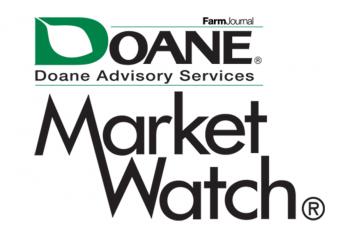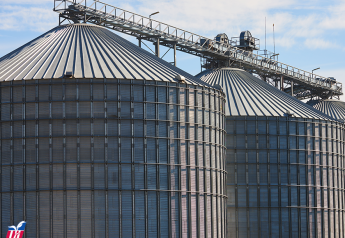Saudi Arabia to Cut Oil Supply; Markets Rise but Long-Term Impact Murky

China’s war hawks make it difficult for U.S. to improve relations with Beijing/Xi
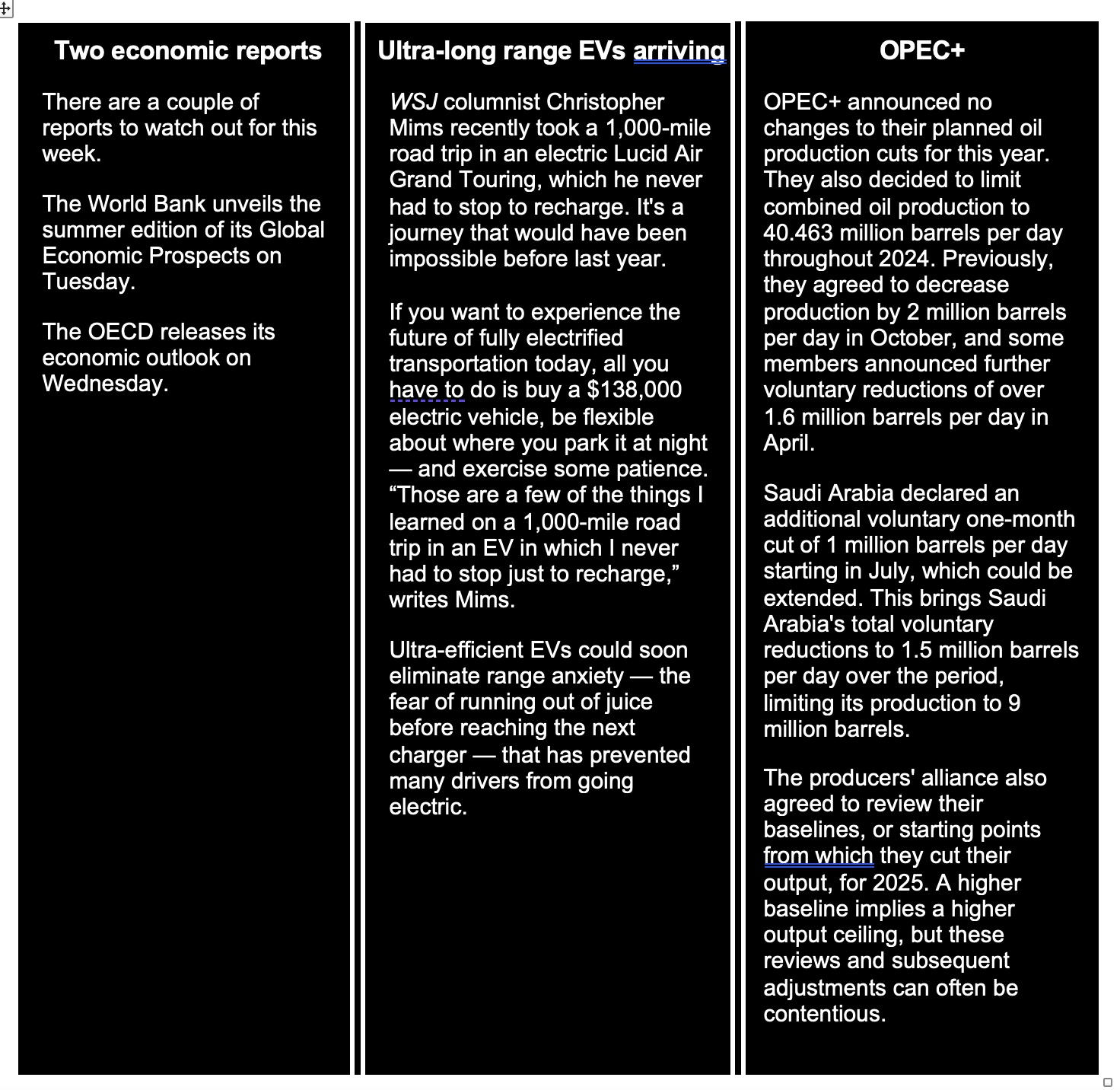
|
In Today’s Digital Newspaper |
Oil prices rose, with WTI crude near $73 a barrel and Brent crude around $77 a barrel after Saudi Arabia pledged to reduce output by another 1 million barrels per day from July. That would bring the country’s production level to around 9 million barrels per day next month, the lowest in years. The arrangement that emerged yesterday was a Riyadh-led compromise, which Prince Abdulaziz bin Salman, the Saudi oil minister, called “a Saudi lollipop” that is meant to sweeten prices for oil traders. Though the cut is meant only for July, it could be extended. The United Arab Emirates saw its production quota grow, after years of lobbying for such a move, while other countries had their targets reduced. The group of countries accounts for about 40% of the world’s crude.
The long-term impact of the move isn’t clear. Goldman Sachs analysts say it could boost the price of Brent by $1 to $6 per barrel. But such a rise is unlikely to hurt consumers or turn gasoline costs into a potent political threat in the U.S., where prices at the pump are down 25% over the past year.
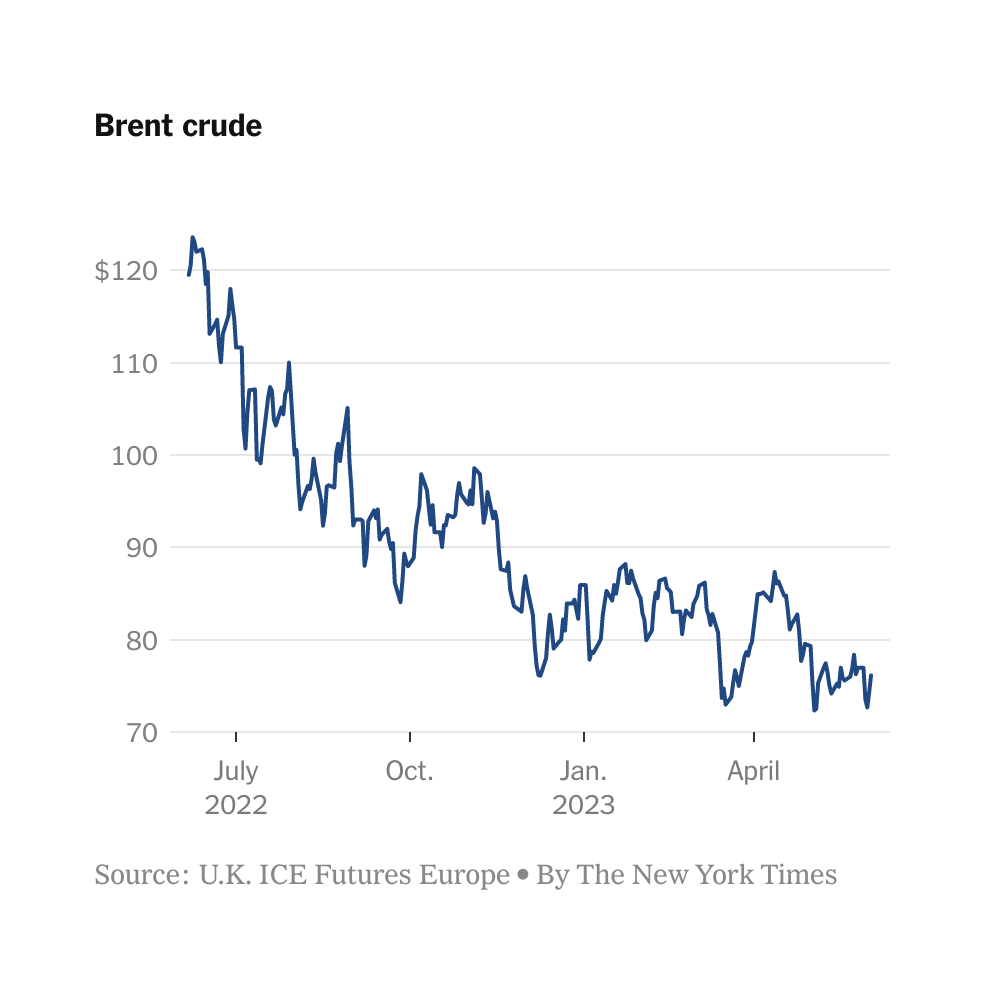
Wall Street is backing off bets that the Fed will make large interest-rate cuts this year. The market has seen a boost this year due to earlier expectations of interest rate decreases by the end of 2023. However, the stronger-than-expected economy led to a shift in investor sentiment. Now, derivatives markets indicate a predicted Fed rate of 5% by year-end, an increase from the previously anticipated 4%. Despite the disappearance of bets on rate cuts causing short-term Treasury yields to rise, other markets have remained unaffected. The combination of stock market gains stemming from both expectations of rate cuts and indications of a strong economy has made it difficult for investors to accurately forecast the market's future trajectory.
Reasons are being cited for why the farm bill is behind schedule to get it done this year. More in Policy section.
Big banks will reportedly be required to boost capital. Regulators are close to adopting new rules that could raise the limit by about 20 percent in a bid to bolster the banking system after several midsize lenders failed this year, the Wall Street Journal reported. The biggest increases are expected to focus on large lenders with substantial trading businesses.
Ukraine is preparing for an anticipated offensive against Russian forces who have constructed an elaborate defense system consisting of anti-tank trenches, concrete barriers, and advanced minefields in southern Ukraine. This network of obstacles may inhibit or slow down Ukrainian attackers. Recently, Russia claimed to have repelled the largest Ukrainian assault in months in eastern Ukraine, as Kyiv attempted to regain initiative in the ongoing 15-month conflict. The Russian defense ministry reported that the attacks coming from six mechanized and two tank battalions were unsuccessful. The Ukrainian ministry of defense has not provided comment on the matter.
We have several updates on the Russia/Ukraine grain export situation in the Russia & Ukraine section.
A defense forum in Singapore kicked off with a friendly handshake between Pentagon chief Lloyd Austin and Chinese Defense Minister Li Shangfu, but ended Sunday with few little hope the countries could avoid an eventual collision. Austin chided China over its refusal to meet unless the U.S. lifted sanctions on Li, while Li accused the U.S. of creating divisive alliances and seeking to contain China with its support for Taiwan. Other countries at the event repeatedly spoke of the dangers posed by rising U.S./China tensions and the need to prevent anything like Russia’s war in Ukraine from occurring in Asia. More in China section.
U.S./China tension over Taiwan escalated over the weekend, as Chinese and American warships got too close for comfort in the Taiwan Strait. The U.S. military released a video of the incident. American officials said the Chinese vessel performed an unsafe maneuver, effectively cutting off the U.S. ship and forcing it to slow down. Chinese officials defended the ship’s actions. China claims Taiwan as part of its territory even as the island self governs.
Some say the new market “shoe to fall” is the commercial real estate sector. See the Markets section for why some are saying that.
Western countries are concerned that China and Russia may exploit the escalating geopolitical tensions in the Arctic to gain influence over the region and its valuable resources.
A mystery trader made a suspiciously timed investment ahead of a surprise debt-ceiling-deal concession. See Markets section for more.
A new wave of job actions, including walkouts and slowdowns, is causing uncertainty for imports at U.S. West Coast ports from Southern California to Seattle.
The rise of robot farmers across America's fields marks a significant transition in agriculture technology and practices. USA Today newspaper takes a look at this topic.
The Spanish agricultural sector is facing a clash over water use that may impact one of its most recognizable exports, strawberries. Details in Trade Policy section.
The Energy & Climate section includes items on:
- A draft document from a United Nations group has sparked controversy over the definition of a carbon offset.
- GM must face consumer claims over ethanol fuel use warning.
- The Office of Management and Budget has continued to schedule more meetings to review the EPA’s Renewable Fuel Standard (RFS) plan. The total count of meetings has reached 37.
- EU solar farms now produce more power than coal plants.
- China's EV battery sector is preparing a new breakthrough.
Eggs are going on sale just months after their prices hit records. Details in Food section.
Hormel Foods has invested significantly in transitioning their pig farms to comply with California's Proposition 12 standards. More in Livestock section.
Germany’s pork consumption per capita has plunged in past years; hog producers and meat processors are withdrawing amid hurdles.
In the Politics & Elections section:
- The United States' state capitals have become increasingly polarized.
- Democratic Senators Jon Tester from Montana and Sherrod Brown from Ohio are in tough re-election races in 2024.
- Delfina Gómez, a former education minister of Mexico’s ruling party Morena, is set to win the governorship of the country’s most populous state with around 52% of votes. The victory gives Morena momentum before next year’s presidential election.
Sonic boom from fighter jets rocks DC. More below.
|
MARKET FOCUS |
Equities today: Asian and European stock markets were mixed overnight. U.S. stock indexes are pointed toward mixed openings. In Asia, Japan +2.2%. Hong Kong +0.8%. China +0.1%. India +0.4%. In Europe, at midday, London +0.5%. Paris -0.1%. Frankfurt flat.
U.S. equities Friday: All three major indices registered gains on Friday, with weekly advances for the Dow and Nasdaq of 2% and 1.8% for the S&P 500. This also marked the sixth winning week for the tech-heavy Nasdaq.
The Dow gained 701.19 points, 2.12%, at 33,762.76. The Nasdaq rose 139.78 points, .107%, at 13,240.77. The S&P 500 was up 61.35 points, 1.45%, at 4,282.37.
CME Fed funds futures ended the week with probabilities at about 72% for a steady rate decision at the June 14 FOMC meeting conclusion, with 28% probabilities for a 1/4-point increase.
Agriculture markets Friday:
- Corn: July corn futures ended the week strong rising 16 1/2 cents to $6.09, marking a 5-cent gain on the week. December corn futures finished up 11 1/4 cents at $5.41 1/4, rising 6 3/4 cents on the week.
- Soy complex: July soybeans rose 23 cents to $13.52 1/2, the highest close since May 16 and gained 15 1/4 cents on the week.
- Wheat: July SRW wheat futures rose 8 1/4 cents to $6.19, nearer the daily high and a 3-cent gain on the week. July HRW wheat gained 9 3/4 cents to $8.12 1/4, nearer the daily high and for the week down 7 cents. July spring wheat rose 20 cents to $8.09 but lost 9 cents week over week.
- Cotton: July cotton fell 37 points to 86.05 cents but gained 270 points week-over-week.
- Cattle: Expiring June live cattle futures rose $1.525 to $176.425 Friday, while most-active August settled at $172.90, up 52.5 cents on the day and up $7.725 on the week. August feeders rose 25 cents to $241.90, which represented a weekly advance of $7.975.
- Hogs: August lean hog futures rose $2.275 to $82.30, near the daily high and for the week gained $8.25.
Ag markets today: Relatively quiet two-sided price action was seen in the grain and soy markets during overnight trade, though futures are firming early this morning. As of 7:30 a.m. ET, corn and soybean futures were fractionally to 2 cents higher and SRW wheat futures were around a penny higher, while HRW and HRS wheat were 4 to 7 cents higher. Front-month crude oil futures were around $1.50 higher, and the U.S. dollar index was nearly 300 points higher.
Market quotes of note:
- Vince Malanga, president of LaSalle Economics: “Inflation is set to slow markedly. Calendar effects will be noteworthy in the May and June price measures. The broad swath of commodity prices is under downward pressure from weakening demand in this country and in Asia. OPEC+ is under pressure to curtail output but Russia’s noncompliance to date raises the risk of an outright price war. We have been expecting inflation to slow to a 3% to 4% rate this summer, but we are thinking the slowing could be even greater. With this backdrop, continuing rate increases by the Federal Reserve are in question. Indeed, the policy rate is already in restrictive territory. The big question continues to be how the Fed views its 2% inflation target. If it remains hell bent on pushing the rate to target, there is sufficient reason to keep tightening, raising the risk of a real recession. Were the Fed to pause in the near term, markets could jump to the conclusion that rate cuts would follow. Legislators were wise to avoid a dollar on the debt ceiling because the deficit and debt would skyrocket in the event of a real recession. This is not the environment in which an incumbent seeking reelection would relish. The Fed should be keeping these pressures in mind as it charts its policy course for the coming months, especially as its balance sheet reduction policy remains active.”
- BRICS raging against the dollar is futile, Bloomberg’s Marcus Ashworth writes (link). The group has 42% of the world’s population. But economically, it delivers just 23% of total global output and only 18% of trade. None, either alone or combined, can magic up an alternative currency.
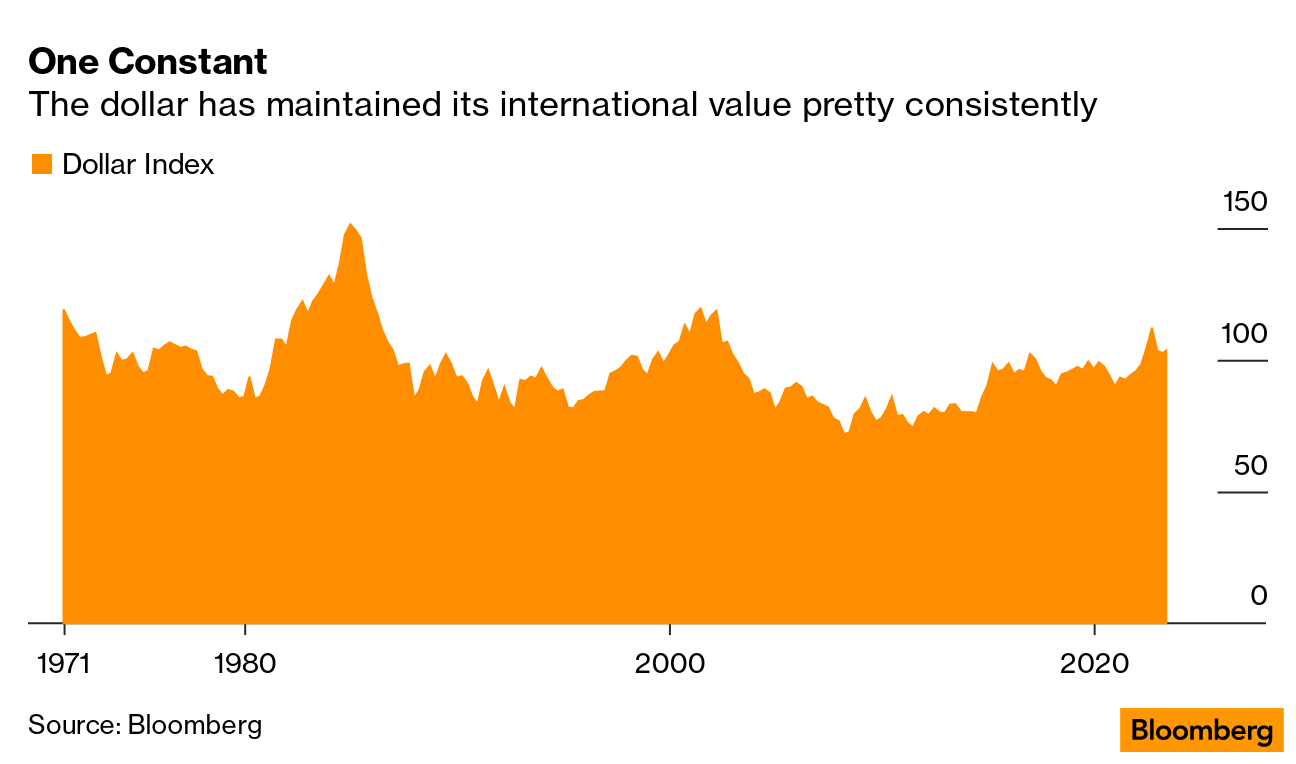
- China: “I think the overall expectation is, following the reopening, the China market was going to bounce back. We have not seen those signs yet.” — Qualcomm Chief Executive Cristiano Amon.
- Retailers are starting to shed warehouse space. “You’re starting to see demand slowing and they’re realizing, ‘Maybe we don’t need as much inventory, and if we don’t need as much inventory, we don’t need as many.’” — Rob Handfield of North Carolina State University, on retailer distribution centers
On tap today:
• European Central Bank President Christine Lagarde appears before a European Parliament committee at 9 a.m. ET.
• S&P Global's purchasing managers index for the U.S. services sector is expected to hold at 51.1 in May, unchanged from a preliminary reading. (9:45 a.m. ET)
• Institute for Supply Management's services index is expected to rise to 52.3 in May from 51.9 one month earlier. (10 a.m. ET)
• U.S. factory orders for April are expected to rise 0.6% from the prior month. (10 a.m. ET)
• USDA Weekly Grain Export Inspections report, 11 a.m. ET.
• USDA Crop Progress report, 4 p.m. ET.
• Note: The House is in session today, the Senate returns tomorrow. President Joe Biden will host British Prime Minister Rishi Sunak at the White House on Thursday. On Friday, Biden heads to the newly renamed Fort Liberty (it was Fort Bragg) in North Carolina.
Producer price inflation in the Eurozone declined to 1.0% year-on-year in April 2023, following a downward revision from the previous month's 5.5% and missing market expectations of 1.4%. The rate of inflation has been easing for eight consecutive months and reached its lowest level since January 2021, primarily driven by a significant drop in energy prices (-8.9% vs 0.0% in March). Excluding energy, producer price inflation slowed to 5.1% year-on-year in April from 8.0% in March. On a monthly basis, producer prices tumbled 3.2% in April, the largest decline on record.
A variety of central bank meetings and economic data releases are scheduled for the coming days. The Bank of Canada (Wednesday), Reserve Bank of Australia (Tuesday), and Reserve Bank of India (Thursday) are not anticipated to raise rates in their respective policy meetings. The European Central Bank will be paying close attention to Germany's struggling industrial sector (Wednesday) as it holds its meeting the following week, with limited rebounds expected for manufacturing orders and industrial production.
In more global news, China is likely to report another significant merchandise trade surplus (Tuesday), while its CPI and PPI data (Friday) is expected to remain relatively stable. Lastly, both Canada and Australia will release key economic data following their central bank meetings, with Canada publishing its labor force survey and Australia announcing GDP figures.
Some U.S. banks are considering the sale of performing property loans, even with borrowers current on repayments, to reduce exposure to the unstable commercial real estate market, the Financial Times report, noting this move is a response to warnings that the asset class may be the "next shoe to drop" after recent turbulence in the U.S. regional banking industry.
HSBC USA is in the process of selling hundreds of millions of dollars' worth of commercial real estate loans, potentially at a discount, to stop direct lending to U.S. property developers, the FT writes. PacWest recently sold $2.6 billion of construction loans at a loss, and others are modifying the way they account for commercial real estate debt to ease future sales.
This shift toward offloading performing loans is an indicator of banks' concerns about potential increases in delinquencies. The lasting popularity of remote work is contributing to a decline in demand for office properties, and a waning appetite for commercial mortgage-backed securities has left banks with more property debt than desired. Although this practice is not as common as during the 2008 crisis, it is anticipated that the volume of selling such loans will rise in the coming years. Banks are aiming to maintain a clean loan book, avoiding raising regulatory or investor concerns.
Bank executives and regulators are voicing their concerns over the health of the commercial real estate sector. Wells Fargo CEO Charlie Scharf predicts losses in the area, and Martin Gruenberg, chair of the US Federal Deposit Insurance Corporation, warns of challenges for real estate loans, particularly those backed by offices, if demand stays weak and values continue to drop. The FDIC will closely supervise these matters.
Upshot: Of around 4,500 regional banks, 20% to 25% of portfolios in commercial real estate (CRE). And a lot of it is underwater. Reasons for CRE crash: Higher interest rates, bad managers and a changed world as workers do not want to return to offices, especially in big cities. Real estate never goes to zero. It's a hard asset, so ownership changes and that lies ahead. New and better managers come in with distressed funds of which there's billions being raised now. So much money on the sidelines waiting that it's going to be a lot softer impact than many think. Investor and analyst Kevin O’Leary says that over the next five years, “we'll go from 4,500 smaller regional banks to 800 Super Regionals that will be well financed.”
The rise of robot farmers across America's fields marks a significant transition in agriculture technology and practices. A USA Today article (link) says these machines, “resembling a mix of Transformers and Edward Scissorhands,” navigate fields of crops like broccoli, using high-resolution cameras to differentiate seedlings from weeds. Companies like FarmWise develop these robots, which employ machine learning to identify plants and eliminate weeds with impressive accuracy.
Not only do these robots outperform human crews, but they don't suffer from heat, fatigue, or discomfort. By mechanizing certain aspects of the farming process, workers have gone from labor-intensive weeding tasks to managing a fleet of these robot weeders. Automated machines are widely used for tasks such as driving tractors, carrying loads, thinning, and weeding, but delicate tasks such as harvesting fruits and vegetables are still some way off in the future.
The adoption of farm robots has potential benefits for both human workers and the environment, streamlining processes and potentially reducing the need for herbicides. As innovative farming technologies continue to be developed and adopted, the article concludes: The way we produce and consume food will be transformed, with potential positive impacts on the environment and human labor.
Western countries are concerned that China and Russia may exploit the escalating geopolitical tensions in the Arctic to gain influence over the region and its valuable resources. They fear the end of Arctic exceptionalism, where the polar region was historically unaffected by global tensions. Senior western policymakers have voiced these concerns in interviews with the Financial Times (link/paywall).
The western members of the Arctic Council halted cooperation with Russia on various environmental and indigenous matters following its invasion of Ukraine. Norwegian Prime Minister Jonas Gahr Støre emphasizes that business as usual cannot continue. Finnish Foreign Minister Pekka Haavisto is worried that the resulting gridlock might lead to a deregulated Arctic, open for exploitation.
A senior policymaker from an Arctic state fears that Russia and China could create their own alternative Arctic Council. Already, Russia has warned it might leave the Arctic Council if it is not allowed to participate while under Norway's presidency. China and Russia, whose relationship has been historically tense, have begun cooperating more closely, evidenced by their joint working body for developing the Northern Sea Route.
The Arctic, with its abundance of resources like oil, gas, and rare earths, has gained the interest of various countries as it experiences rapid warming. The Arctic Council has tried to keep geopolitics out of the region; however, Russia's increasing military presence and China's growing influence have altered the situation. Attempts by China to build infrastructure in Greenland were halted by Danish intervention, following U.S. recommendations.
Danish Prime Minister Mette Frederiksen warns against naivety regarding the Arctic and calls for increased awareness of China's role in the region. Norway is trying to work with other Arctic Council members while excluding Russia, but diplomats admit that Russia's exclusion presents a dilemma, as the Arctic's management is difficult without Russia's involvement.
Market perspectives:
• Outside markets: The U.S. dollar index was firmer amid weakness in the euro and British pound against the greenback. The yield on the 10-year U.S. Treasury note was higher, trading around 3.73%, with a higher tone in global government bond yields. Crude oil futures have continued to rise, with U.S. crude around $73.65 per barrel and Brent around $78 per barrel. Gold and silver futures were under pressure, with gold around $1,954 per troy ounce and silver around $23.38 per troy ounce.
• The market is bracing for a glut of Treasuries. Now that President Biden has signed the debt ceiling deal into law, the Treasury is expected to begin selling more than $1 trillion in new securities. Some warn the auctions could jack up short-term borrowing costs and drain liquidity from parts of the market, with Bank of America predicting that the effect would be equivalent to a 0.25% interest rate increase by the Fed.
• Saudi Arabia announced on Sunday that it will cut 1 million barrels of oil per day in July as part of a deal between OPEC and its Russia-led allies. The decision came after one of the most contentious production meetings in recent years, with growing concerns over a slowing global economy and energy demand. The cut is in addition to previously announced curbs, which will be extended until the end of 2024. The United Arab Emirates and other large producers also extended their previously announced cuts. Saudi Arabia's decision to voluntarily cut output helped the group come to an agreement and keep their existing production targets until the end of the year. The only real change for next year will come from the United Arab Emirates, which will be able to raise production by 200,000 barrels a day.
Despite potentially boosting oil prices in the short term, analysts expect prices to continue trending lower. U.S. gasoline prices are down more than 25% from a year ago, and Brent crude is down about 20% since OPEC+ first slashed output in October. While Saudi Arabia has been actively propelling efforts to bolster energy prices, Russia has been pumping huge volumes of cheaper crude into the market, undermining these efforts. The Saudi oil minister's efforts to prop up prices could reflect an underestimation of concerns over a slowing global economy.
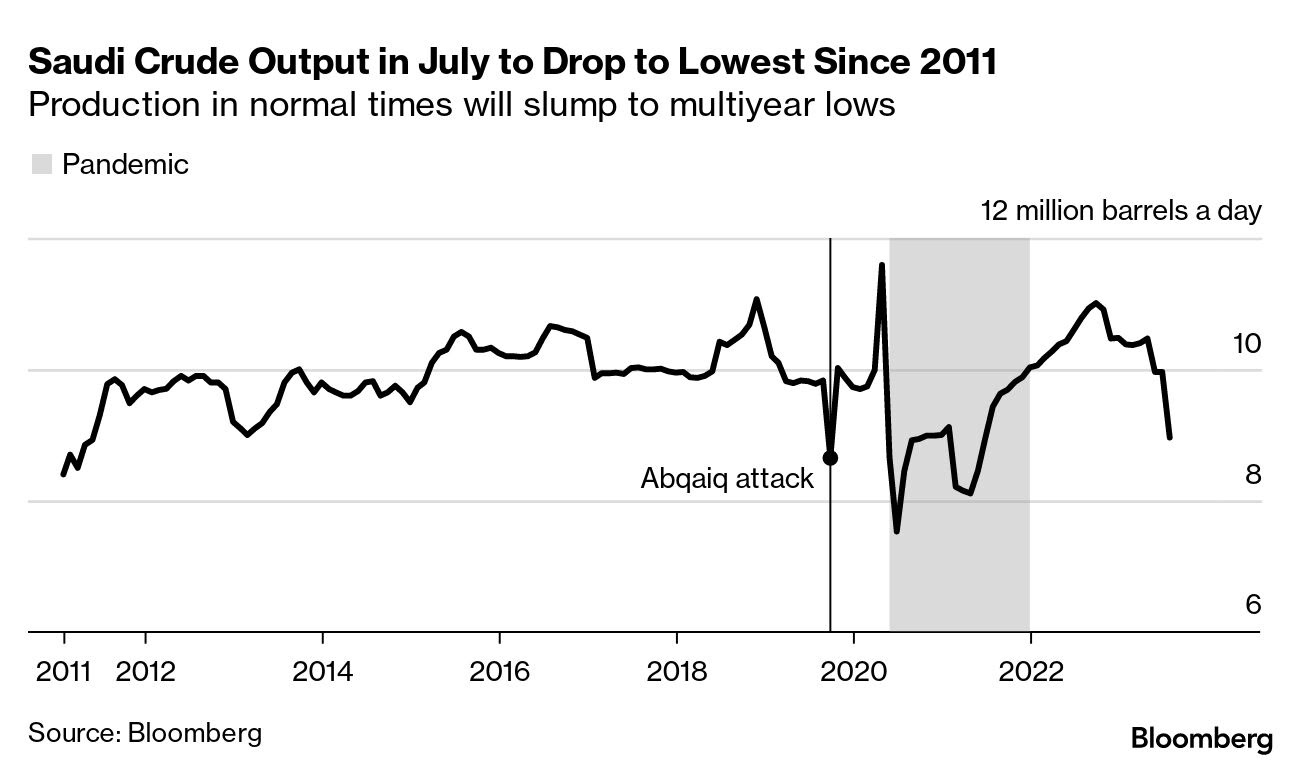
• A mystery trader made a suspiciously timed investment ahead of a surprise debt-ceiling-deal concession. There was no public reason to believe that the approval of the Mountain Valley Pipeline — a pet project of Sen. Joe Manchin — would be included. But a trader bought 100,000 call options on the pipeline's owner days before it was announced. Link for more.
• Asset managers joined hedge funds in increasing yen-bearish positions amid speculation the Bank of Japan isn’t likely to rush to adjust its ultra-easy monetary policy. A week after leveraged funds increased net shorts on the yen to the most in almost a year, asset managers boosted such positions to the biggest so far for 2023 in the five days through May 30.
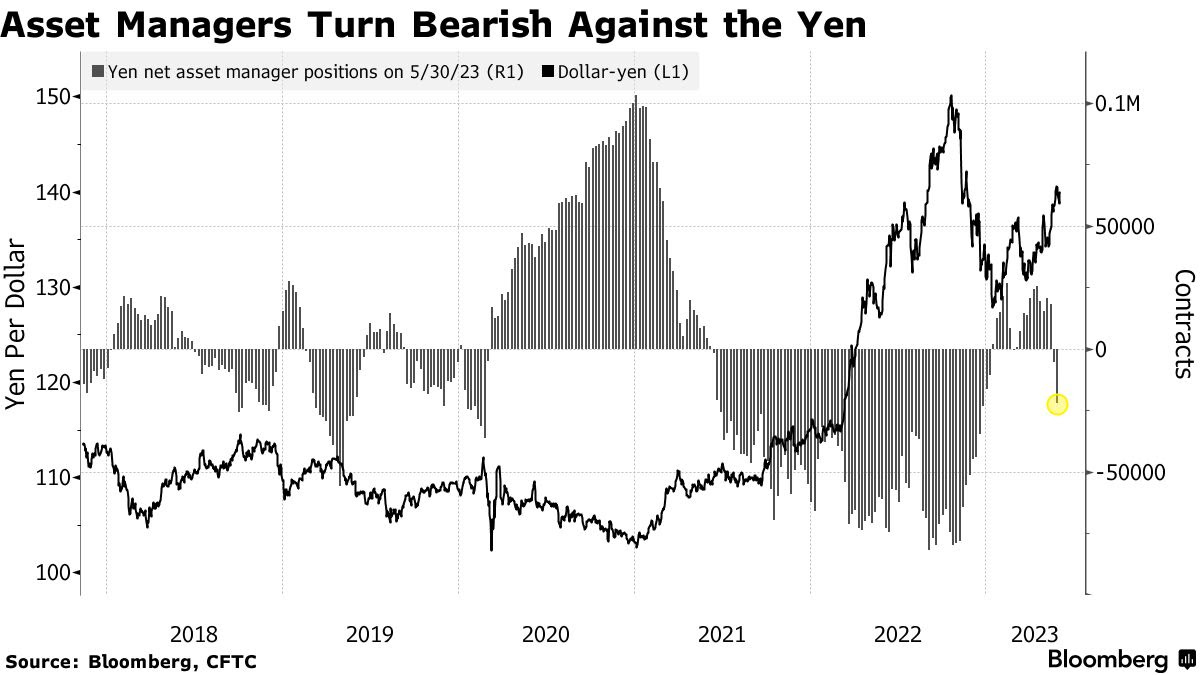
• A new wave of job actions, including walkouts and slowdowns, is causing uncertainty for imports at U.S. West Coast ports from Southern California to Seattle. This follows more than a year of contract negotiations between dockworkers and port employers, and seems to reveal deep divisions between the parties. As talks now focus on wages, expectations for a resolution have been dampened. A longshore union local has pointed out that while container shipping lines made billions of dollars in profits during the Covid-19 pandemic, 43 dockworkers died. Negotiators will attempt to bridge this gap this week while terminal operators and importers prepare for possible further disruptions.
• Commodity prices are in retreat, signaling a slowdown in the world economy but lending central banks a hand in their fight against inflation. The S&P GSCI commodities index has fallen about 11% so far this year through Friday, as prices for energy, metals, grains and other raw materials have retreated. Crude oil is close to its lowest levels since just before Russia’s invasion of Ukraine — even after Saudi Arabia’s weekend decision to cut output boosted prices early Monday. Wheat hasn’t been this cheap since 2020 and natural gas has taken a tumble in Europe. Almost every commodity besides weather-affected sugar, cocoa and coffee has pulled back. Niche materials such as glass have fallen. Copper, a bellwether for the global economy because of its use in everything from buildings to cars, has slipped 1.3% this year.
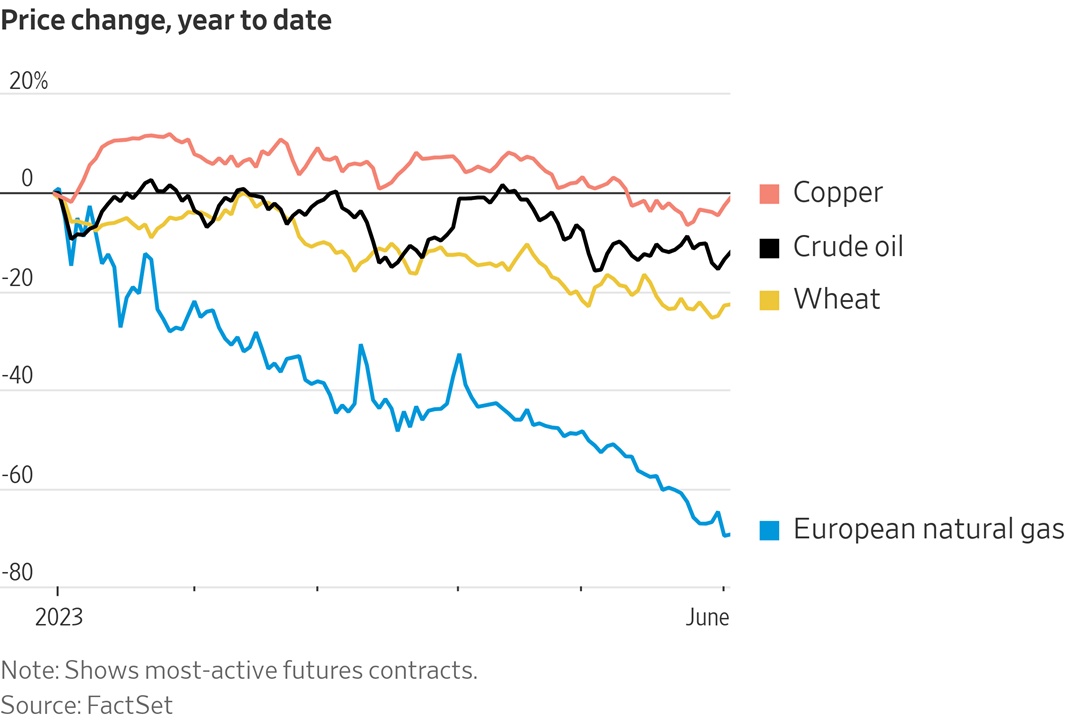
• Raw sugar futures in the U.S. fell past 24.7 cents per pound in early June, the lowest since April, on signs of strong supply. Current weather forecasts suggest that precipitation in top producer Brazil is expected to ease soon, enabling the progress of the ongoing harvest. Other forecasts expect India and Southeast Asia to receive regular amounts of monsoon rainfall in 2023 despite the possible arrival of El Niño, easing concerns that adverse growing conditions would further hurt yields. The developments counter recent threats to supply that lifted prices to an 11-year high of 27 cents in late April. Droughts in growing regions of India hampered the country’s crops enough for the government to tighten the grants of export licenses. Additionally, gasoline taxes in Brazil support the demand for biofuel alternatives, swaying cane producers to blend ethanol instead of crushing the sweetener, and effectively reducing supply.
• Ag trade: Saudi Arabia purchased 624,000 MT of optional origin wheat, with much of it likely to be sourced from the Black Sea region, especially Russia. Indonesia plans to import 1.53 MMT of soybeans and 1.34 MMT of corn by the end of this year.
• NWS weather outlook: There is a Slight Risk of excessive rainfall over parts of the Southern High Plains through Wednesday... ...Temperatures will be 15 to 20 degrees below average over New England... ...Air Quality Alerts over parts of the Upper Great Lakes.

Items in Pro Farmer's First Thing Today include:
• Grains mostly firmer to start the week
• Mostly dry, but moderating temps this week
• Bullish cash cattle hopes
• Cash hog index picks up steam
|
RUSSIA/UKRAINE |
— Russia said it had thwarted a “large-scale” Ukrainian offensive and killed 250 Ukrainian troops. According to Russia’s defense ministry, the attacks originated from five different points along the frontline in Donetsk, an eastern region. The claims have not been verified and the Ukrainian government has not commented. For months, Ukraine has been preparing for a counter-offensive. Over the weekend the army again asked citizens to not speculate about its plans.
— Russia: Black Sea grain inspections resume but ‘no prospects’ for another renewal. Russian news agencies reported that the country's Foreign Ministry sees no prospects for extending the Black Sea Grain Initiative beyond its mid-July expiration. Russia desires the reopening of an ammonia pipeline to the port of Pivdennyi and for Rosselkhozbank to regain access to the SWIFT payment system. Ukraine is willing to consider reopening the pipeline, but wants the number of ports involved in the grain deal to be expanded. Western countries, however, remain opposed to granting SWIFT access for the Russian agricultural bank. This news aligns with Russia's previous statements as the deal approached renewal deadlines in March and May. The next meetings are scheduled for June 9.
— As the import ban on Ukraine's grain shipments is extended until mid-September, tensions may rise between Kyiv and its European neighbors. In late April, Poland, Slovakia, Hungary, Romania, and Bulgaria introduced EU restrictions on Ukrainian grain imports instead of unilateral bans, reasoning that the influx was damaging local farmers. Grain shipments from Ukraine, which is a key global supplier, have faced disruptions due to Russia's invasion. Despite a U.N. and Turkey-brokered safe maritime corridor established for Ukrainian crop exports, shipments continue to be frequently disrupted. Ukraine is calling on the EU to end the import ban, with Agriculture Minister Mykola Solskyi choosing to reserve his comments until an official decision is announced.
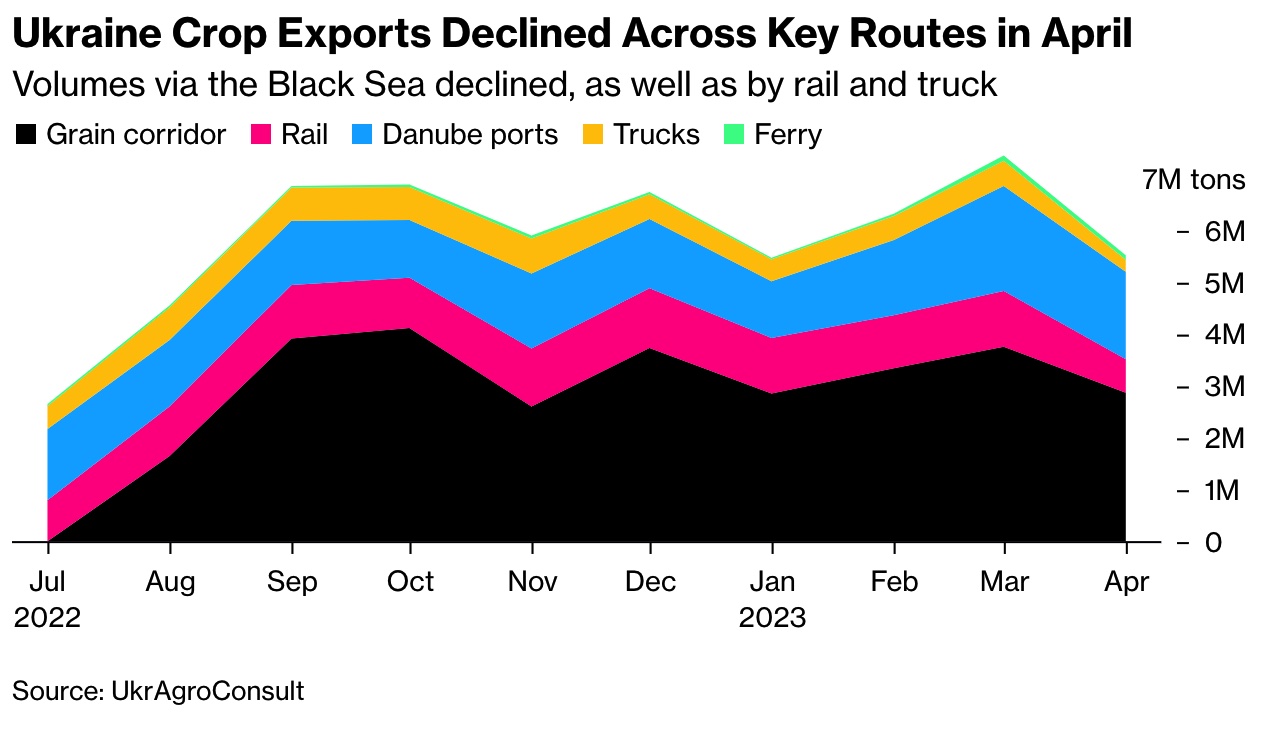
— In May, Ukrainian food exports reached a record 3 million metric tons (MMT) through the Danube River, as shipments via Black Sea ports saw a significant slowdown. The Ukrainian seaport authority highlighted that three Danube ports in the country handled 5.5 MMT of cargo in 2021, compared to 4.06 MMT in 2020. To expand its grain export routes, Ukraine is considering deepening the Danube shipping canal this year. Currently, the Danube is responsible for approximately 25% of Ukraine's agricultural exports, with 25% going through Western land borders and 50% via Black Sea ports, as reported by Reuters.
— Ukraine winter grain yields could suffer if hot, dry conditions persist. Most of Ukraine’s winter grain crops are in good condition but yields could fall by 20% if current dry and hot weather persists, APK-Inform consultancy quoted agricultural scientists as saying. “In general, weather conditions for most of the spring period were sufficiently favorable for growth and development of winter cereal crops,” Ukraine’s national academy of agricultural science said in a report. “However, in case of continuation of dry weather in the period of grain filling, especially on the background of high air temperatures... the share of lost yields can be from 15% to 20%,” it said, giving no exact production forecast.
|
POLICY UPDATE |
— Reasons are being cited for why the farm bill is behind schedule to get it done this year. The Senate and House Agriculture committees are facing delays in drafting the next farm bill, and it is expected to be the most expensive farm bill to date, clocking in at around $1.5 trillion. The process is “behind schedule” judging by past experiences with previous farm bills. Neither of the committees have established a timeline for crafting the legislation, although whispers have a draft coming before the August recess, or no later than September. Budget issues, the recent debt ceiling negotiations, and updated CBO projections have contributed to the uncertainty and stalling.
Of note: House Speaker Kevin McCarthy last week signaled that House Republicans would likely seek further changes in work requirements or other reforms relative to some programs. Previously, the 2014 and 2018 Farm Bills experienced delays, both due to conflicts over the SNAP program, which represents $4 out of every $5 in the legislation. Senate Agriculture chairwoman Debbie Stabenow (D-Mich.) has stated that the issue of work requirements is settled and will not be altered. However, the House Agriculture Committee plans to hold a hearing discussing "opportunities for modernization" of SNAP and other programs that are part of the farm bill.
— WSJ: U.S. may impose higher capital requirements on big banks. Large banks in the U.S. may face a 20% increase in capital requirements after a string of collapse of smaller regional lenders this year, the Wall Street Journal reported (link). Those with large trading businesses would take the biggest hit. The revised requirements may be proposed as early as June.
Bottom line: Overall capital requirements could be raised by about 20% at institutions with at least $100 billion in assets, compared to the current $250 billion threshold that regulators currently reserve for their toughest rules. Credit card giants that are heavily dependent on fee income could also be impacted, as well as those involved in investment banking and wealth management.
|
PERSONNEL |
— Polly Trottenberg is expected to be appointed as the interim leader of the Federal Aviation Administration (FAA), according to the Wall Street Journal. Trottenberg, currently serving as the Deputy U.S. Transportation Secretary under the Biden administration, might take over the role as the government's efforts to install a permanent leadership for the FAA have been struggling. Acting FAA administrator Billy Nolen is anticipated to leave the agency soon, possibly this week. Trottenberg has had various roles in transportation, including serving as an assistant transportation secretary during the Obama administration and as New York City's transportation commissioner from 2014 to 2020, where she worked on reducing pedestrian deaths. The FAA has been without a permanent leader since former administrator Steve Dickson, appointed by Trump, stepped down in 2022. The White House has not yet named another nominee for FAA leadership since Phil Washington withdrew his nomination due to Republican opposition.
— New food-agency ambassador. President Biden tapped Jeffrey Prescott, a high-level State Department official, to serve as U.S. ambassador to the U.N. agencies for food and agriculture in Rome. Link for details.
|
CHINA UPDATE |
— The Shangri-La Dialogue, a defense forum held in Singapore, recently ended with little sign of reconciliation between the U.S. and China. U.S. Defense Secretary Lloyd Austin criticized China for refusing to engage in substantive dialogue unless the US lifted sanctions on Chinese Defense Minister Li Shangfu. This coincided with a Chinese vessel harassing an American warship in the Taiwan Strait, highlighting the escalating tensions between the two superpowers.
Li retorted by accusing an unnamed "big power" of creating divisive alliances, bullying other nations, instigating an arms race, and attempting to contain China through its support for Taiwan. He stated China's military "will not hesitate for a second" to act on Taiwan if necessary, dismissing concerns about near-collisions in disputed waters.
Several countries expressed concerns about the rising U.S./China tensions and stressed the importance of preventing a conflict akin to Russia's war in Ukraine in Asia.
Despite the tension, there are signs of increased communication between the U.S. and China, with several high-profile meetings scheduled for the upcoming months. Nonetheless, the forum underlined growing divisions between China and the U.S. over the international order, and their respective views on the Ukraine crisis and the implications it holds for global defense and security.
While the U.S. and its allies warned against the risk of allowing Russia to maintain territorial gains, Chinese officials blamed NATO for triggering Russia's war and criticized the U.S. for its selective application of international rules and norms.
U.S. Secretary of Defense Austin, however, sought to reduce fears of a potential war, denying that the U.S. is seeking to create a NATO-like body in the Asia-Pacific region. Despite this, China's defense minister maintained that Beijing was prepared to pay any price to support its claim over Taiwan.
Upshot: The risk of conflict in the Western Pacific is increasing due to China's growing assertiveness with the intention of dominating the region. Tension has mounted in recent weeks with incidents such as the close interception of a U.S. reconnaissance plane, the snubbing of a U.S. request for a meeting, and the close proximity of a Chinese ship to a U.S. missile destroyer in the Taiwan Strait. Despite the Biden administration's attempts to improve relations with Beijing, China seems unresponsive. China wants the U.S. not to impose new restrictions on investment or to remove sanctions against its defense minister. But China watchers say the country’s aim is to assert its control over the Western Pacific, which requires pushing the U.S. out. The situation is delicate, with President Xi Jinping warning his national-security officials to prepare for the worst.
— CIA Director William Burns made a secret visit to Beijing last month to meet his opposites. Washington is eager for nuclear arms talks with China, National Security Advisor Jake Sullivan said. A top Treasury Department official met Ambassador Xie Feng on Friday. And GOP lawmakers ramped up a push for retaliation for Beijing’s Micron ban.
— China allocates wheat aid. China will allocate 200 million yuan ($28.11 million) to help central Henan province contend with wheat harvest losses caused by heavy rain, the finance ministry said. The funds, on top of 200 million yuan already issued by the provincial government, were granted after recent heavy rains and flooding led to severe wheat quality issues.
|
TRADE POLICY |
— The Spanish agricultural sector is facing a clash over water use that may impact one of its most recognizable exports, strawberries, the Financial Times reports (link/paywall). A German activist group, Campact, is calling for a boycott of "drought strawberries", citing the use of illegal wells by some Spanish farmers. The dispute focuses on a legislation proposed by the Andalusian conservative government that would potentially legalize around 1,000 illegal wells; some critics argue that this could drain Doñana, one of Europe's most important wetlands. The issue highlights water scarcity as a critical problem for Europe, with increased tensions between multiple water users and environmental protection demands.
This conflict has intensified political tensions between Spain's ruling Socialist party and the conservative People's party. Campact's campaign has garnered about 160,000 signatures and urged large supermarket chains like Lidl and Aldi to stop buying produce from the Huelva province of Andalusia, an area heavily affected by this water dispute. Notably, this region is also experiencing a prolonged drought, further complicating the situation. EU environment commissioner Virginijus Sinkevičius has shown support for the Spanish central government's opposition to the Andalusian law, while Aldi Nord has implemented sustainability requirements for its suppliers.
The People's party insists its proposed bill aims to address farmers' economic concerns by reversing a 2014 law that restricted water rights and maintains that their plan would not harm the Doñana aquifer. However, the European Commission has said that the proposed bill contradicts a 2021 European Court of Justice ruling that required Spain to act on the issue. The outcome of this dispute will depend on further negotiations and discussions among stakeholders.
|
ENERGY & CLIMATE CHANGE |
— A draft document from a United Nations group has sparked controversy over the definition of a carbon offset, raising questions about what qualifies as carbon removal. The document highlights nature-based solutions, like tree planting, and downplays the role of technological methods of carbon dioxide removal (CDR), such as machines. The carbon removal industry sees this distinction as vital to its existence.
The Intergovernmental Panel on Climate Change (IPCC), another U.N.-backed group, has warned that billions of tons of carbon will need to be removed from the atmosphere annually by mid-century to keep global warming within 1.5C. The market for carbon offsets, currently estimated to be around $2 billion, could grow to between $160 billion and $624 billion annually by mid-century, according to BloombergNEF.
Critics argue that if the U.N. prioritizes nature-based solutions, it could exclude the growing CDR industry from the carbon offset market, potentially hindering climate efforts. The U.N. draft criticized CDR for not contributing to sustainable development and for being technologically and economically unproven. It also argued that CDR is unsuitable for implementation in developing countries and does not reduce global mitigation costs. Despite these criticisms, the document praised traditional carbon market solutions like reforestation, despite evidence of their limitations and potential negative impacts on human rights.
The controversy highlights the growing tension around what constitutes a ton of carbon removed and stored, and the lack of a cheap, easy, durable, and permanent carbon-removal solution. Currently, the options are nature-based solutions, which are less expensive, or more durable removal techniques, which come at a premium. The U.N. draft appears to favor the former. Experts suggest a balanced portfolio of solutions, recognizing the strengths and weaknesses of each approach.
— GM must face consumer claims over ethanol fuel use warning. A General Motors Flex Fuel car owner raised sufficient claims in his latest proposed class complaint alleging the automaker misled drivers about how much ethanol-based fuel the vehicles can use, a federal judge said Friday.
Chevrolet Impala owner Michael Fleury has received permission from Judge Virginia M. Kendall to proceed with his claim against General Motors. His car's fuel pump failed after using E85 (85% ethanol) consistently, which he alleges the owner's manual did not adequately disclose. Previously, his claims were dismissed under the Illinois Consumer Fraud Act as he couldn't show he relied on false or deceptive statements on the vehicle. However, Fleury now claims to have relied on the owner's manual itself for E85 usage guidance.
The court ruled that Fleury's new claim connected statement, reliance, and injury and that his common-law fraud claim was sufficiently pleaded. The court added that GM's statements about E85 use in the owner's manual established a duty to disclose the risk of fuel-pump failure related to consistent E85 use.
— RFS update. The Office of Management and Budget (OMB) has continued to schedule more meetings to review the EPA’s Renewable Fuel Standard (RFS) plan. The total count of meetings has reached 37, with the most recent additions involving Veriflux on June 9 and EcoEngineers on June 13. As of now, 17 meetings are slated for this week, followed by an additional 10 during the first two days of the next week. EPA has committed to finalizing the plan by June 14, following a lawsuit brought forth by Growth Energy, who will also meet with OMB on June 9..
— EU solar farms now produce more power than coal plants. The European Union’s transition to clean energy marked a milestone in May, when solar panels generated more electricity than all of the bloc’s coal plants for the first time — and that’s before the summer sun boosts production even further. Power prices turned negative during some of May’s sunniest days as grid operators struggled to handle the surge.
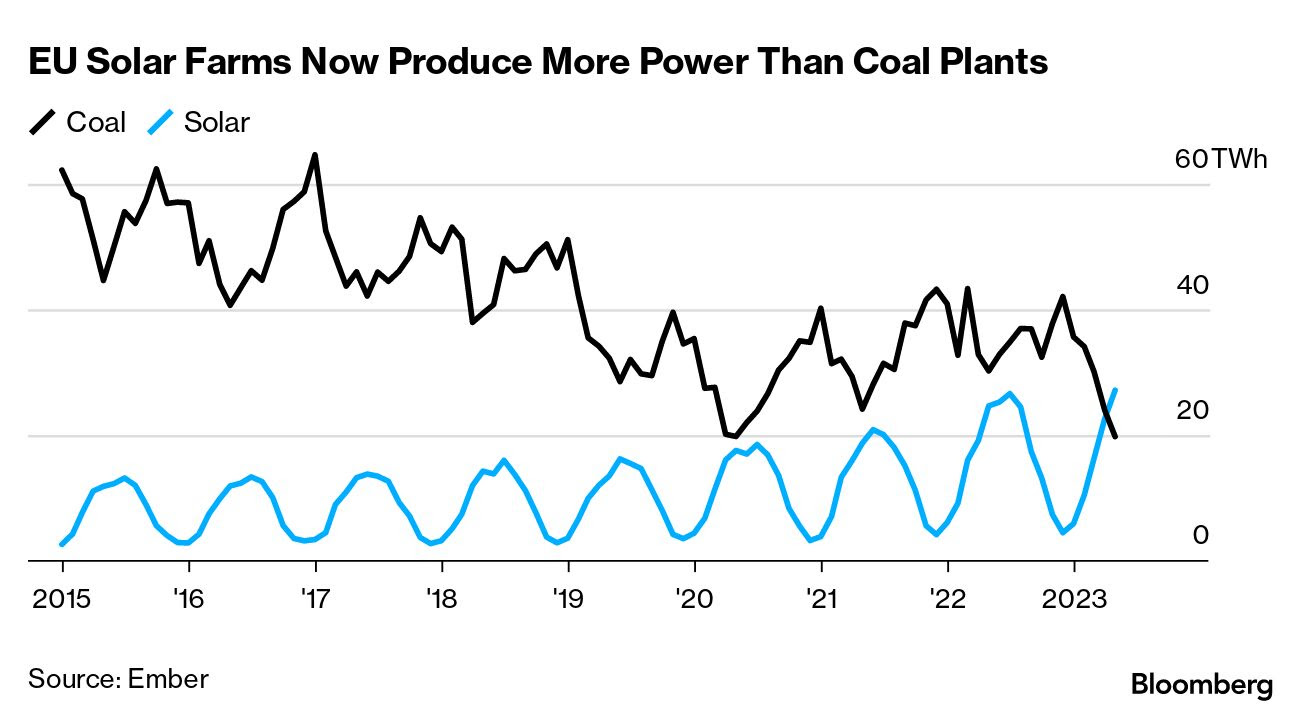
— China's EV battery sector is preparing a new breakthrough. One of China’s top battery-makers reckons it has cracked a technology to provide even cheaper and more powerful packs for electric vehicles. Gotion High-Tech Co. recently unveiled a lithium-iron-manganese-phosphate battery which it says will power an EV for 1,000 kilometers on each charge. Link to more via Bloomberg.
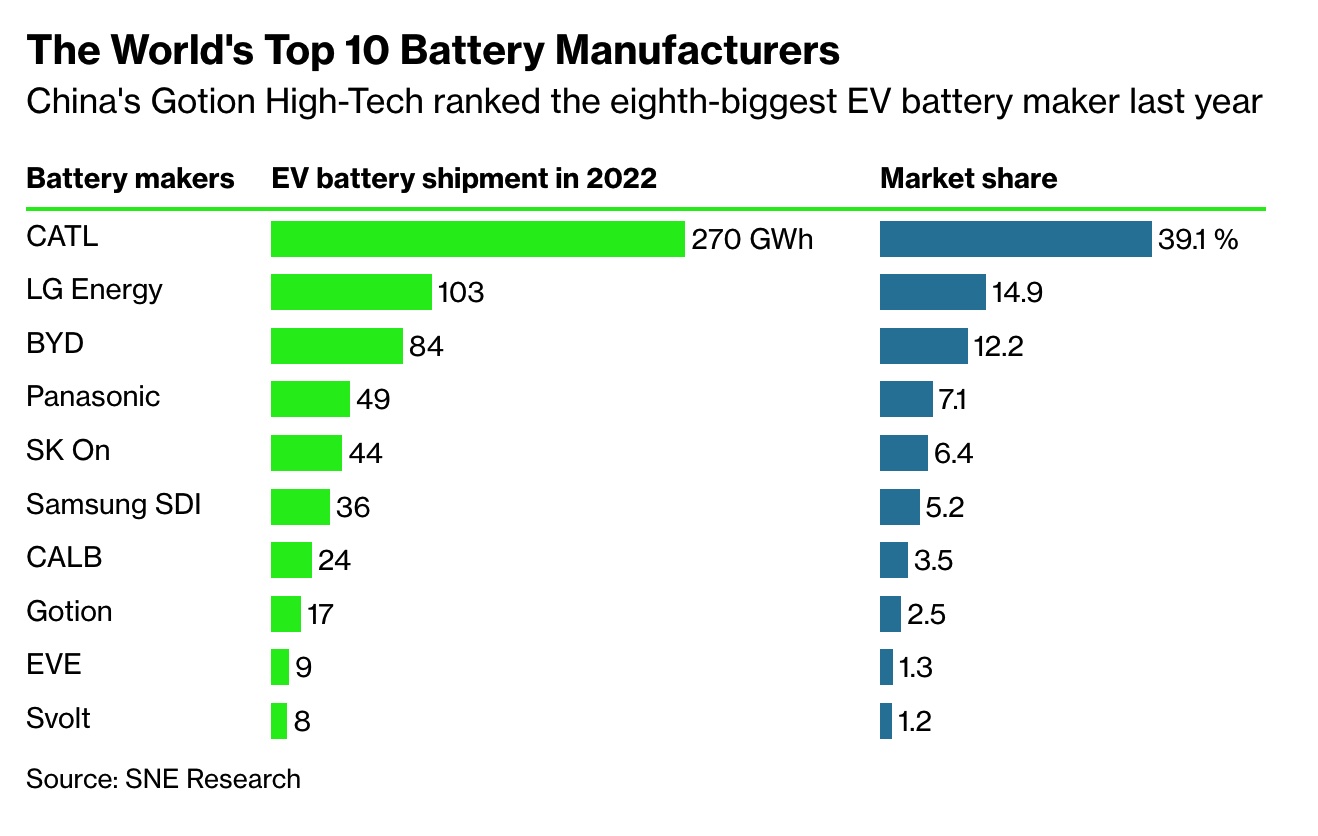
|
LIVESTOCK, FOOD & BEVERAGE INDUSTRY |
— Eggs are going on sale just months after their prices hit records. Industry officials and farmers say egg supplies have bounced back after the deadliest avian influenza outbreak in U.S. history helped push prices above $4 a dozen in January. Now, after shoppers have cut back on eggs, tested substitutes and in some cases raised their own chickens, some supermarket chains are discounting eggs for the first time in more than a year, the Wall Street Journal reports (link).
Egg price surged in 2022, where costs rose more than 30%, led to consumers exploring egg substitutes and even raising their own chickens. The price increase was attributed to the avian flu, which killed about 59 million birds since February 2022 and reduced U.S. egg inventories by 29% by the end of the year. USDA reported that new bird flu cases have decreased significantly in recent months, with egg-laying hen populations recovering. The average retail price of eggs was $2.70 a dozen at the end of April, compared to a five-year high of more than $4 in January. Despite the recovery, the rapid price drop has affected egg farmers' profits, and the egg market remains vulnerable to a potential resurgence of bird flu.
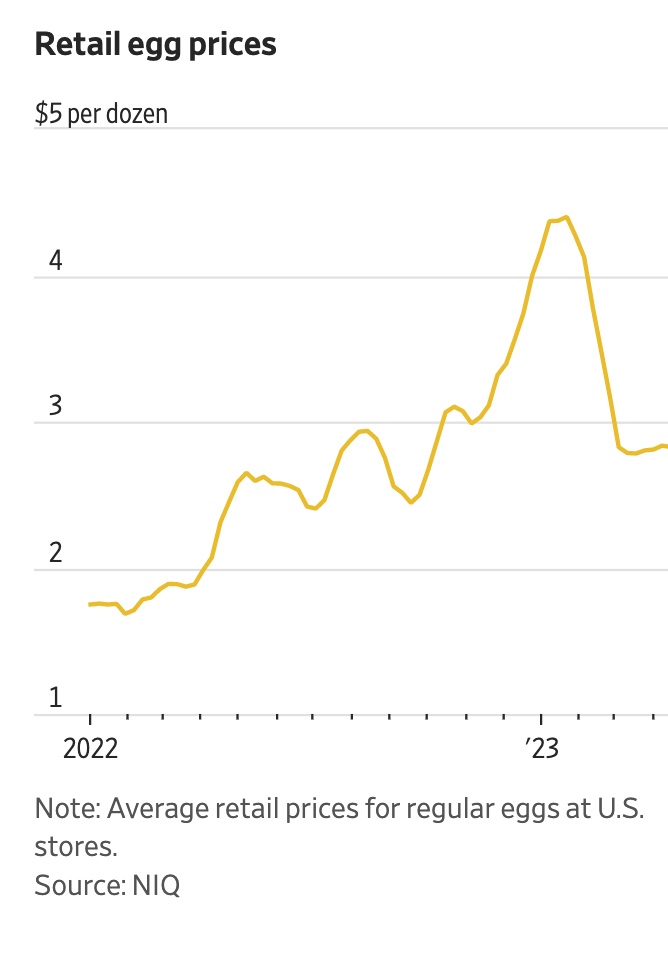
— Hormel Foods has invested significantly in transitioning their pig farms to comply with California's Proposition 12 standards, which aim to eliminate sow gestation stalls from the state's pork supply chains. While the exact cost of the endeavor has not been disclosed, Hormel CEO Jim Snee expects the company to start recuperating those costs soon. They have already been Prop 12-compliant for part of their pork supply since January 2022.
— Germany’s pork consumption per capita has plunged in past years; hog producers and meat processors are withdrawing amid hurdles. Bloomberg reports (link) that the northwest German town of Vörden's meat plant, known for producing the beloved bear-shaped cold cut Bärchenwurst, has announced its closure due to rising production costs and waning pork demand. This reflects the challenges faced by Germany's pork industry, which is grappling with decreased demand following the African Swine Fever outbreak, along with economic constraints and stricter animal welfare provisions.
Consumption figures reveal that the average German ate 40 kilograms (88.2 pounds) of pork per year in 2007, dropping to 29 kilograms (63.9 pounds) in 2022. With changing trends in diet and young Germans favoring other types of food, Germany's pork industry is fighting to stay relevant in the rapidly shifting landscape. A higher percentage of the population is now vegetarian or "flexitarian," while environmental and health concerns are shaping consumers' choices away from meat-intensive diets.
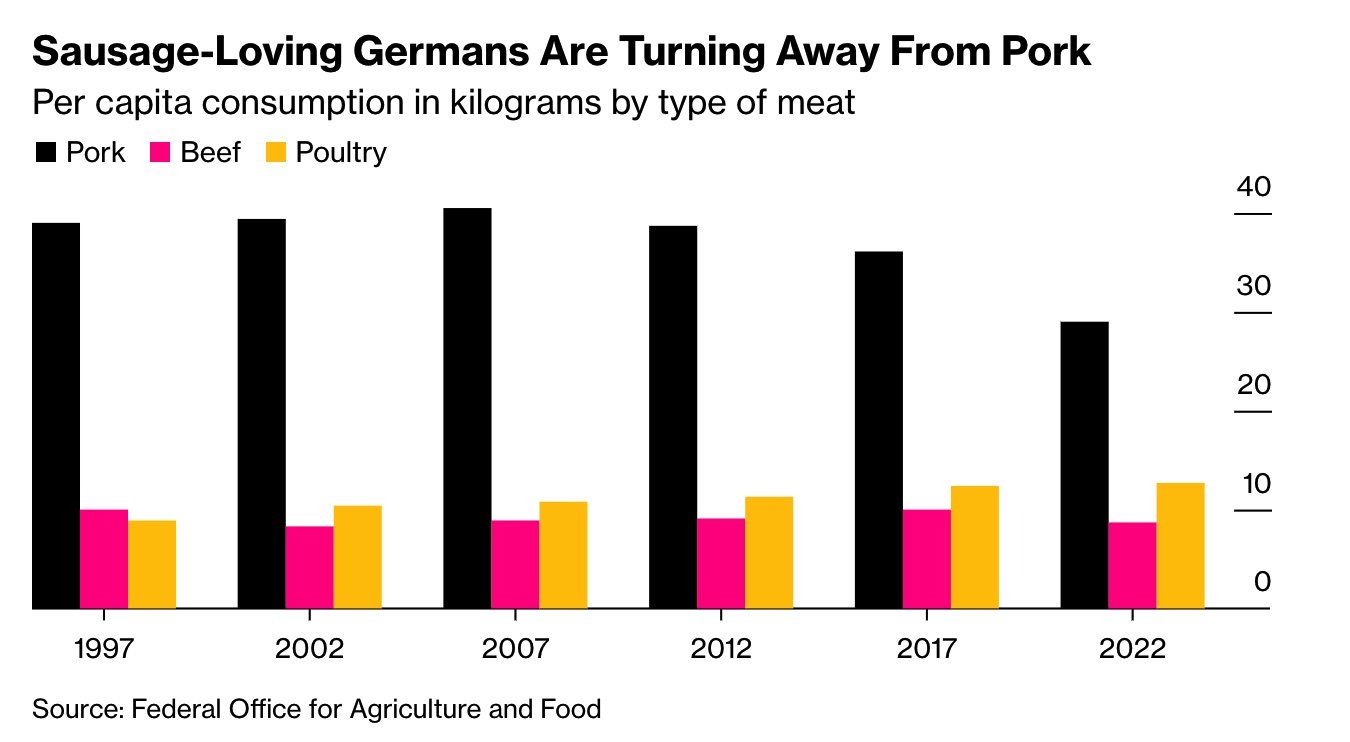
Pork consumption is decreasing worldwide, but Europe is facing an especially significant decline. EU pork consumption is expected to be the lowest in over two decades, and production is anticipated to shrink by a tenth within two years. The German pork industry is struggling from an array of factors, such as demographic changes, cultural shifts, and public health crises.
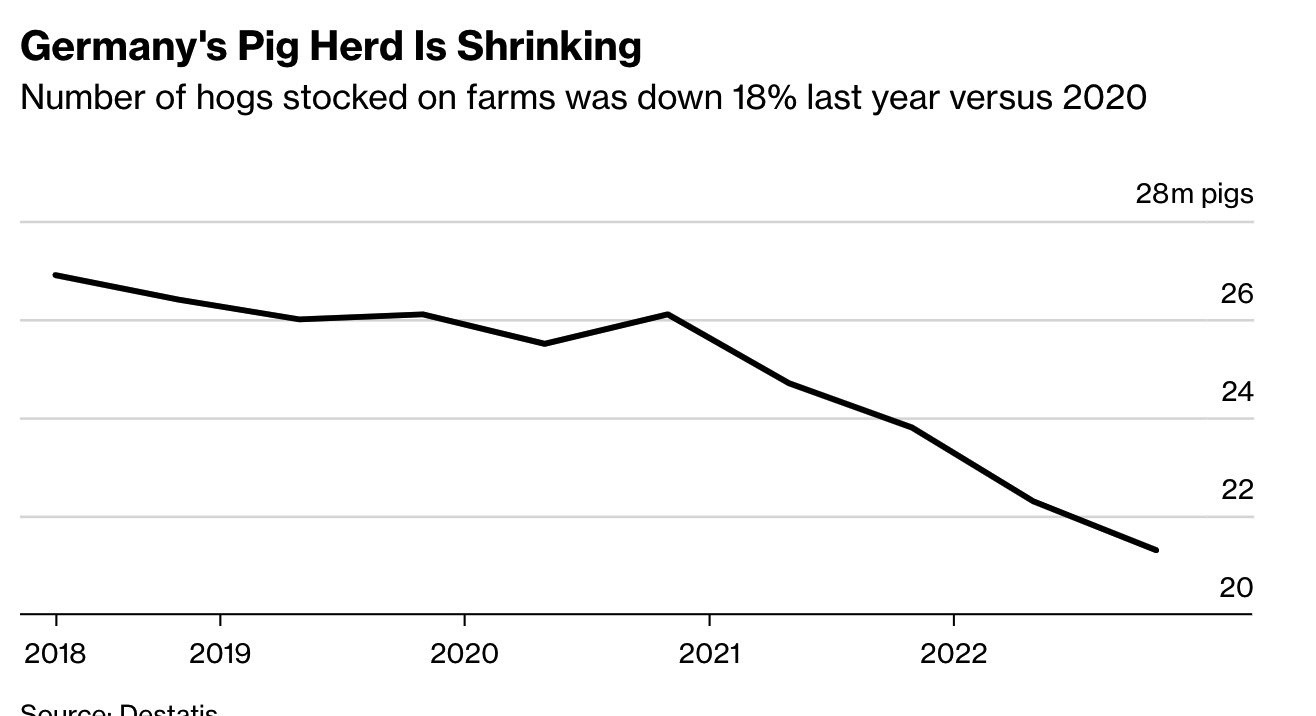
In response to these challenges, some traditional sausage makers have embraced plant-based alternatives, driving a large growth in this sector. Companies like Rügenwalder Mühle have successfully made the switch, earning more from plant-based products than conventional meat products. This diversification could potentially help businesses to weather the shift away from meat consumption in the future.
|
POLITICS & ELECTIONS |
— The United States' state capitals have become increasingly polarized, with lawmakers pushing staunchly conservative or liberal agendas, according to a New York Times report (link). The 2022 election resulted in single-party control of the governor's office and legislature in 39 states, the most in over three decades. This has led to a widening divide on significant social issues between Republican and Democratic states.
In Republican-led states, legislation often centered around restrictions on abortion, gender transitions for youths, and sexuality discussion in classrooms.
Meanwhile, Democratic states focused on introducing gun control measures, setting carbon emission limits, and creating safe havens for abortion and transgender medical care.
This trend towards polarization is apparent not only in long-standing single-party strongholds, such as Washington (Democratic) and North Dakota (Republican), but also in states traditionally considered political battlegrounds. Florida, for instance, under Republican Governor Ron DeSantis, passed laws restricting abortion and banning transgender medical care for minors. Similarly, Minnesota, where Democrats recently gained full control of the statehouse, saw Governor Tim Walz signing bills codifying abortion rights, legalizing recreational marijuana, and expanding voting rights for felons.
Critics argue that this polarization risks alienating significant portions of the population and creating potential long-term political risks. Furthermore, some legislators believe this could result in a system that no longer works due to a lack of minority party input and representation.
— Democratic Senators Jon Tester from Montana and Sherrod Brown from Ohio are in tough re-election races in 2024. They both have a history of winning tough elections, which means they have a good chance to hold onto these crucial Senate seats in increasingly Republican states. However, the political climate has been shifting since their last elections and these once traditionally Democratic states are showing more support for Republican candidates. And in the case of Tester, voters are beginning to see he suddenly gets more conservative around election time.
Born and raised in their respective states, Tester and Brown have forged strong connections with their constituents by focusing on specific groups or regions. Tester has built a reputation as a rural politician, proudly representing his home state and focusing on rural America's challenges. Brown has won the trust of the blue-collar workers by concentrating on workers' rights and other labor issues.
— Delfina Gómez, a former education minister of Mexico’s ruling party Morena, is set to win the governorship of the country’s most populous state with around 52% of votes. Her victory ends almost 100 years of dominance by the opposition Institutional Revolutionary Party in the State of Mexico, which surrounds the capital city. The victory gives Morena momentum before next year’s presidential election.
|
OTHER ITEMS OF NOTE |
— Sonic boom from fighter jets rocks DC. People around the nation’s capital were shocked to hear a mysterious “boom” sound yesterday at about 3:10 pm ET. Turns out the source was F-16 fighter jets traveling at supersonic speeds to intercept a Cessna aircraft that was not responsive. That private plane crashed in Virginia about 20 minutes after the boom was heard. As of last night, authorities did not know why the pilot was unresponsive or how many people were on board.
— A Utah school district banned the best-selling book of all time. The Davis School District in Utah is removing the King James Bible from its elementary and middle schools after a parent complained it was too violent and vulgar to be read by children.
|
KEY LINKS |
WASDE | Crop Production | USDA weekly reports | Crop Progress | Food prices | Farm income | Export Sales weekly | ERP dashboard | California phase-out of gas-powered vehicles | RFS | IRA: Biofuels | IRA: Ag | Student loan forgiveness | Russia/Ukraine war, lessons learned | Russia/Ukraine war timeline | Election predictions: Split-ticket | Congress to-do list | SCOTUS on WOTUS | SCOTUS on Prop 12 pork | New farm bill primer | China outlook | Omnibus spending package | Gov’t payments to farmers by program | Farmer working capital | USDA ag outlook forum | Debt-limit/budget package |

